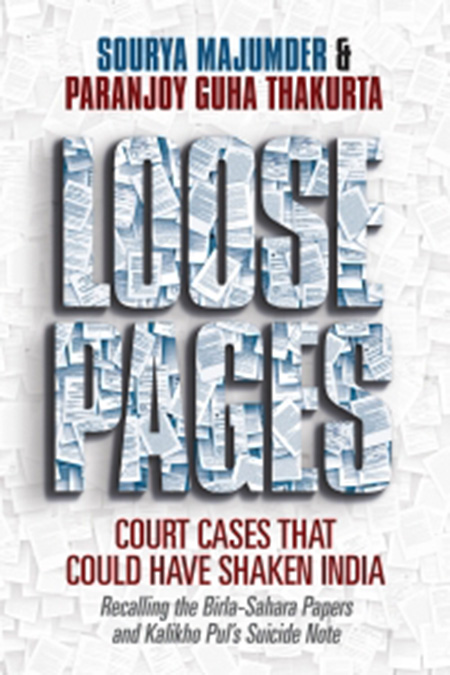The Madhya Pradesh Vyavsayik Pariksha Mandal (Vyapam) or Professional Examination Board scam threatens to destabilise not only the government of Shivraj Singh Chouhan (who has been chief minister of the state since November 2005), but the ruling Bharatiya Janata Party as well. Prime Minister Narendra Modi’s silence on the issue and attempts by BJP functionaries to brazen it out may backfire on the state government in Bhopal as well as the Central government in Delhi.
A superficial reading of the scam — a complex web of bribery and corruption in the admission of students to educational institutions, especially medical colleges, and in recruitments for government jobs — may lead one to ask: So what’s new? Answer: apparently nothing.
This is hardly the first scam that involves powerful politicians, influential bureaucrats and sundry rich businessmen, some of them posing as educators while others are mining barons. This is also not the first time that accused persons and potential witnesses in a scam have died under unusual circumstances. Remember the fodder scam involving former chief minister of Bihar Lalu Prasad Yadav who was arrested and jailed? Or, the more recent rape cases involving so-called godman Asaram Bapu and his son?
The Vyapam scam dates back several years. Why then has it been hitting the headlines with unflagging regularity over the last few weeks? Is there anything particular about the Vyapam case that makes it unique and different from other abuses of power and authority, other instances where doctors and government officials (including police constables) have been recruited not because of their competence but on account of their ability to bribe?
While there have been innumerable scams across the country relating to bribes-for-admission to institutions of higher education and millions of instances of illegal payment of money for recruitment to government jobs, the sheer scale of the Vyapam scam boggles the mind of even the most cynical Indian. Just take a look at some of the numbers: At least 24 officially confirmed “unnatural deaths” of accused persons and suspects, including government officials, have taken place. This was stated in a status report filed by a special task force (STF) headed by Chandresh Bhushan, a retired judge of the Madhya Pradesh high court, that had been appointed by the court to monitor the investigations. The investigations have now been taken over by the Central Bureau of Investigation.
In the days following the submission of the STF report on June 26, “mysterious” deaths have taken place. There are varying claims of the total number of suspects, accused persons, their family members and witnesses who have died under unusual circumstances, including instances of “suicides”. The “unofficial” death count is twice, thrice and more than six times the “official” number, depending on who is making the claims. Many among the dead were people in their 20s who had allegedly paid bribes to intermediaries of politicians and government officials for admission into medical colleges or those who benefited from recruitment processes for junior-level government jobs being manipulated. Most important among these is the death of Shailesh Yadav, son of incumbent Madhya Pradesh governor Ram Naresh Yadav (who belonged to the Congress).
Close to 2,000 persons have been arrested, a few hundred people are said to be absconding and almost 200 individuals have filed petitions saying they fear for their lives. Among the big names allegedly involved in the scam — directly or indirectly — are not just chief minister Chouhan and governor Yadav but a Union minister (Uma Bharti), a national spokesperson of the BJP (Sudhanshu Mittal), two of the senior-most functionaries of the Rashtriya Swayamsevak Sangh (Suresh Soni and Prabhat Jha), besides state ministers and members of Parliament.
Much of the information pertaining to the Vyapam scam was known two years ago when, following a tip-off from whistleblower Anand Rai, eight people were arrested as they attempted to appear for an entrance examination to a pre-medical course by impersonating candidates in Indore. In January 2014, Mr Chouhan acknowledged in the Assembly that the STF had detected some 1,000 bogus appointments and college admissions.
Why then has the Vyapam scam attracted so much public attention now? Many of the deaths have taken place after the STF expedited its probe to meet the deadline of June 15 for filing of chargesheets that had been imposed by the Supreme Court. This has raised many suspicions. The attention of the national media was drawn to the scandal after the unexpected death of Akshay Singh, a journalist from the popular Hindi television news channel Aaj Tak.
The scandal raises a number of critical questions and issues. Thousands of undeserving candidates have become doctors; what happens to the hundreds of thousands of patients they treat? What about those deserving candidates, who became doctors despite their inability — or that of their families — to pay bribes? Are they too going to be tarnished with the same brush?
Mr Chouhan’s supporters claim he is an efficient administrator. During his tenure, farmers in his state have benefited considerably, agricultural production has risen impressively and there has been communal harmony. After the Vyapam scandal, Mr Chouhan’s reputation has taken a severe beating.
In what is arguably Agatha Christie’s best-known novel that has reportedly sold over 100 million copies, And Then There Were None, 10 people who escaped punishment for committing crimes, are enticed to an island. The story ends with all the 10 dying and the reader learns how the deaths took place through a confessional postscript.
Fact is stranger than fiction. When the full truth about the Vyapam scandal is known, it will be an account that will be more macabre than the world’s best mystery thriller.


